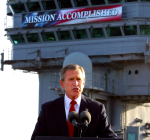Iraq in the Mirror of Media: 10 Years Later
The 10th anniversary of the U.S.-led invasion of Iraq was duly noted during the last couple of weeks by myriad media outlets. Although there was a lot of 20/20 hindsight, what the babblesphere mostly didn’t do was to examine its own reportage and commentary from 10 years ago to see how it stands up to the judgment of what we hesitantly call “history.”
I think of such self-examination as “The Orwell Test”: can you reprint what you wrote then without undue embarrassment now? (George Orwell almost always could, as his 4-volume posthumously published Collected Essays, Journalism and Letters demonstrates.)
Here’s what we said at Dooney’s Cafe precisely (give or take a few days) a distant decade ago. I’ll check in at the end of the documentation to make any required amendments:
Vancouver, April 14, 2003
On the Recent Punitive Expedition
While the guns of war are blasting away, the Muses, like reticent Canadians, tend to be discreetly silent. If only the army of commentators had followed their modest example. But that was too much to hope for. After all, CNN, Fox and the rest of the unleashed dogs of journalism had a lot of air time to fill while the rest of us were dutifully staring at the speckled-green-and-black, night-vision-provided, videophone-transmitted still lifes of Deserta Arabia.
And thus for three weeks, the “All War, All the Time” channels treated us to the opinions of every otherwise underemployed former U.S. general (ret.), CIA agent, special forces op, security specialist, and terrorist expert who could be embedded in a TV studio — a true coalition of the willing and well-paid — plus the reportage of several hundred officially “embedded” reporters in the field.
By contrast, Noam Chomsky and other critics of the war got little air time. I think there was one brief glimpse of roly-poly Michael Moore in the wake of his Oscar acceptance speech denouncing the “fictitious” president and his “fictitious” war. The deaths, mainly of thousands of Iraqis, were, however, all too real. During an off-hour, former U.N. arms inspector Scott Ritter, a tenacious opponent of the attack, was briefly paired with another former arms inspector, who just happened to be a CIA agent. That was about it for critical thought.
On the whole, as in national coverage of Olympic sporting events, there was a lot of rooting for the home team, and barely a scintilla of analysis, except for instrumental accounts of strategy. Certainly no debate. Nor were the Arabic-speaking viewers of Al-Jazeera or Abu Dhabi, as far as we could tell, much better served, unless gory close-ups of the wounded victims count as an improvement on “sanitized” American coverage. If truth is the first casualty of war, propaganda is its first victory.
Now that the “Attack on Iraq” (or whatever war logo appeared on your local TV provider’s screen) is mostly over, let’s see if we can make some tentative Monday morning sense of the situation. So, the conflict turned out to be not quite a walk in the park, or even a stroll in the Hanging Gardens of Babylon, despite the advance spin, but it clearly was an action that remained within the bounds of a classic punitive expedition by an empire, rather than something that could be described as a real war, i.e., a contest between two or more, more-or-less evenly matched, equally armed combatants, whose outcome is unpredictable.
The moral balance sheet remains, I think, unchanged from the lead-up to the expedition. That is, in terms of international law, the attack was dubious, to put it mildly. The Iraqi regime did not pose an imminent physical threat to the U.S. or its Middle Eastern neighbours. There were no “weapons of mass destruction,” at least as far as we know, as of this date. Worse, for U.S. ambitions, the United Nations-sanctioned arms inspections appeared to be demonstrating that as a fact. Nor were the non-existent WMDs used by the despotic regime in defense of its territory. The Iraqi government, then, was not in violation of the U.N. resolution mandating its disarmament. There were no discernible ties between Saddam Hussein and the terrorist al-Qaeda organization, or between the Iraqis and 9/11, even though a majority of the American public was brainwashed into thinking so. The U.N. Security Council was shown to be ineffective, simply because the empire refused to abide by its refusal to go to war. Thus, we remain at a sorry distance from a semblance of global governance. Even the U.S. POWs were all found to have been treated in accordance with the Geneva Conventions by their supposedly barbaric captors.
All of the above is, or ought to be, uncontroversial. It was the case made by the Left, and provided the intellectual grounds for the protests by millions of people in cities around the world. The slightly bathetic banner under which we marched (I dutifully trudged in the streets of Vancouver) was, “The other Superpower is the People,” a slogan that remains hopeful rather than accurate.
The case against the invasion of Iraq was made not only by the Left, however. My own weathervane on the plausibility of the anti-war argument was, oddly enough, moderately conservative Globe and Mail columnist Jeffrey Simpson. If someone like Simpson couldn’t be persuaded to jump aboard the war caravan—-and, it turned out, he couldn’t be persuaded—-it was a measure of the shakiness of the pro-war rationale. So, the case against the recent punitive expedition holds good, but good cases in global politics and $4 will only get you a Starbucks double latte. Anyway, I prefer to slurp my cappuccino at the more comfortable Dooney’s, amiable sponsor of these musings.
There’s an on-the-other-hand to all this. If it were up to the official peace-loving braintrust, Slobodan Milosevic would continue to rule in Belgrade, Sarajevo, and Zagreb, the Albanian Kosovars would be under an iron heel, the Taliban would still hold office in Afghanistan, Afghan women would remain wrapped in their burkas, and the quarter-century old Saddam Hussain regime would be contentedly puffing on Cuban stogies during tomorrow’s photo ops. Which is to say that the issue of “humanitarian intervention” into the politics of heretofore sovereign despotisms is far from resolved. We still don’t know what to do about greater or lesser evils.
Among the cameos in the recent unpleasantness–as we Canadians like to euphemistically refer to such slaughters–there was one hapless Columbia University professor named de Genova, who prayed aloud for a “hundred Mogadishus” to be visited on the American expeditionary force. Obviously, this scholar was out of touch with recent advances in U.S. military technology or had succumbed to the myth that the obesity epidemic had rendered the empire’s hoplites unwilling to risk life and limb. The prof was promptly forced into hiding, leaving civil libertarians to gingerly point out that free speech is neither a cause for lynching nor an academic firing offense. Most of the rest of us, once the tanks were rolling towards Baghdad, sensibly hoped for the removal of Saddam and Co. in the shortest possible time and with the least possible loss of life.
Oh yes, just one note on the unloveliness of the masses, American and Iraqi. The Yanks were at their least charming when it came to rounding on the politically uncooperative French, foregoing the pleasures of French plonk, cuisine, and kisses in the name of ethnic patriotism. Nor was I thrilled by rumours of grassroots American prayer circles, importuning strange gods on behalf of the troops. The U.S. ability to identify fundamentalism at a distance is no accident, I’m afraid.
But equally, I didn’t much enjoy either the Saddam rent-a-crowds nor the post-Saddam mobs. If it is a clash of civilizations, and it probably is, I’ll stick with the Enlightenment, if I can find it. Iraqi civilization reached its apogee in Babylon. Why was I not surprised when the mob did a drive-by ransacking of the museum of Mesopotamian treasures?
Meanwhile, oh Canada. The Chretien government, in fine Canadian tradition, dithered—-but this time it was the right kind of dithering. Dithering against the war. Except for the bellicosity of the Canadian Alliance’s Stephen Harper and Izzy Asper’s money-losing National Post, we had a good non-war. Naturally, we’re eager to help with the clean up. Since lots of Iraqi civilians still seem to be bearing arms, maybe we could offer them our wonderful gun registration system.
And now there’s the aftermath. As Naomi Klein and other critics of globalization will shortly point out, if they haven’t already, the few days of looting in Baghdad will prove to be nothing compared to the plunder of “reconstruction.” The billions of dollars to be had in letting contracts to Anglo-American multinationals for the refurbishment of an infrastructure that was already crumbling prior to the “precision” bombing, and the privatisation of Iraqi oilfields, may extend the notoriously short political attention span of the U.S. beyond the predictable amnesia. But democracy in Iraq? Maybe in a decade, if everything in the post-expedition wilds of Iraq goes just right.
Where does the empire go from here? Despite U.S. Secretary of Defence Rumsfeld rattling, but hopefully not flinging down, his gauntlet at Syria, I suspect the road from Baghdad leads not to Damascus but to Jerusalem. If the empire understands its interests, dismantling Jewish settlements in the West Bank and the negotiation of a Palestinian state would be its shrewdest move. As for us, it’s time to turn off CNN. In the name of timeliness, we’d do better to read Decline and Fall of the Roman Empire in order to determine if this is 100 B.C. or 200 A.D.
***
P.S.: Ten Year Later
We stand by our story, as they occasionally say in the news business.
About the only thing that’s changed at our end of the tale is that Dooney’s Cafe in Toronto, where we went for our mocha as an alternative to the corporate brew at Starbuck’s, now only exists in cyberspace. The real Dooney’s shut its doors a few years ago, leaving us with some pleasant memories of proprietor Graziano Marchese and the best literary cafe east of the Rockies. As for us, we make do with virtual reality and its virtual clouds at www.dooneyscafe.com.
Today in Iraq, there’s a nominally democratic government shakily in place, but it doesn’t function very well. There’s infinite reconstruction, but during the week marking the 10th anniversary of the fall of Saddam, another 60 people were killed in Baghdad bombings by the ever-shadowy opposition. We asked in 2003: “But democracy in Iraq? Maybe in a decade, if everything… goes just right.” It didn’t.
In the interim, several “sovereign despotisms” in the Middle East have fallen to the sandstorm of the “Arab Spring,” but the character of their replacements remains undefined, while other neighbouring despotisms are still untoppled. The checkpoint-cluttered road to Jerusalem has yet to yield peaceful solutions, and the road to Damascus, allegedly the route of St. Paul’s conversion, is littered with dead bodies.
Berlin, April 4, 2013.


